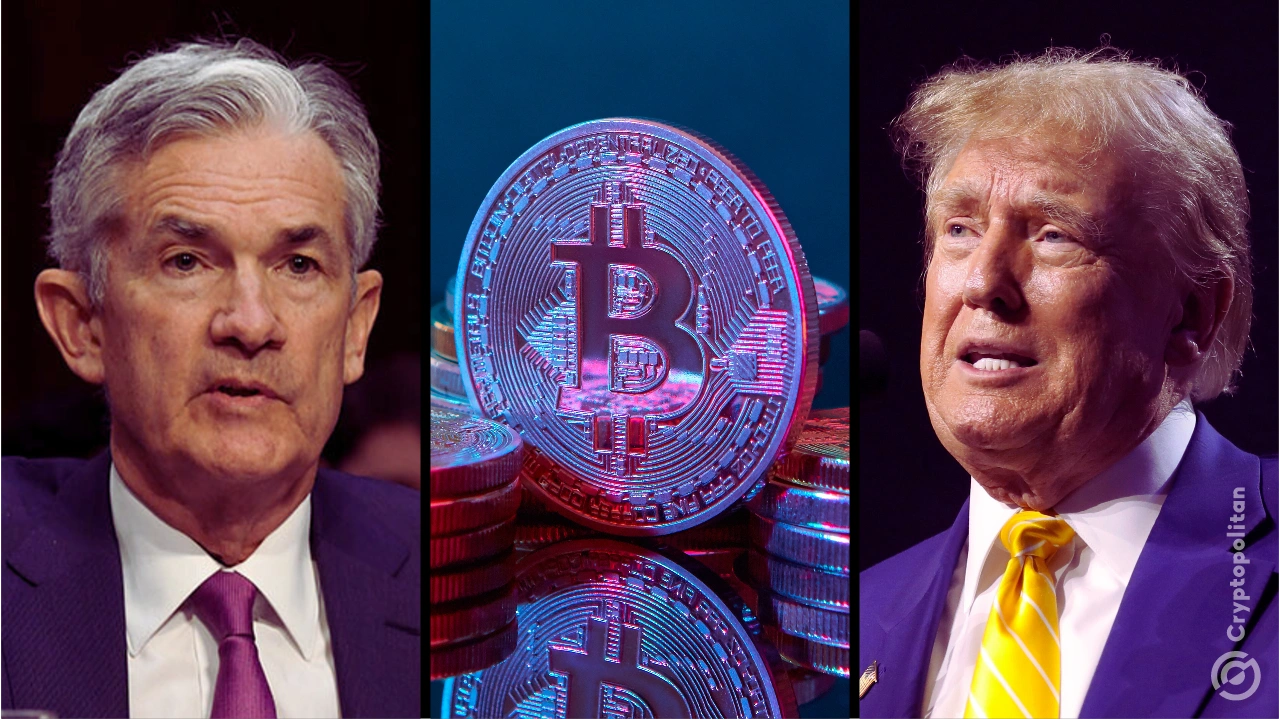Jerome Powell isn’t new to pressure, but he’s never had a storm like this. Between President-elect Donald Trump questioning his independence and crypto advocates demanding policy changes, Powell is juggling criticism from so many sides.
Yet, he’s standing firm, refusing to bend to Trump’s threats or the growing political tension surrounding the Federal Open Market Committee (FOMC).
Trump has made Powell and the Fed his latest punching bags, accusing them of playing politics and even threatening a full-on hostile takeover. The Fed Chair, however, isn’t biting. Instead, he’s doubling down on the institution’s independence, brushing off Trump’s outbursts. And he’s had plenty.
Trump turns on Powell, his own pick for Fed chair
Donald Trump and Jerome Powell’s relationship started on a high note. Trump personally nominated Powell to lead the Federal Reserve in 2017, calling him a leader with “sound judgment.” Fast-forward six years, and the tune has changed.
Trump now accuses Powell of manipulating interest rates for political gain. During his election campaign, the president told Fox News, “It looks to me like Powell is trying to lower interest rates for the sake of maybe getting the Democrats elected.”
The irony isn’t lost on anyone. Legally, though, the president can’t simply dismiss the Federal Reserve Chair. The role is shielded from political interference, a cornerstone of the Fed’s independence. Powell has repeatedly emphasized this, stating, “We make decisions for all Americans, not for any political party.”
When asked about the accusations at The New York Times DealBook Summit, Powell said, “I never discuss what elected officials say. I’m focused on the economy.” His focus, he says, remains on maintaining stability in what he calls a “remarkably strong” U.S. economy.
He also said that if Trump does try to come for him, he’d fight back with all his legal might. And under US laws, he actually has enough to defeat the president.
Scott Bessent, a potential pick for Treasury Secretary under Trump’s administration, has proposed creating a “shadow Fed Chair” to oversee monetary policy. According to Bessent, Powell’s influence has diminished to the point where “no one cares what Powell has to say anymore.”
When confronted with Bessent’s comments, Powell dismissed the idea outright, saying, “I don’t think that’s on the table.” Powell also pointed out the importance of collaboration between the Fed and the Treasury, adding that the two institutions have maintained weekly meetings for decades.
A national Bitcoin reserve?
Trump also has his eyes on a bold new proposal: the BITCOIN Act of 2024. Introduced by Senator Cynthia Lummis, the act aims to establish a national Bitcoin reserve, positioning the U.S. as a dominant force in the global crypto market.
The plan is ambitious. Over five years, the government would purchase up to 1 million bitcoins, making the U.S. one of the largest Bitcoin holders in the world. To fund this, the proposal relies on two main sources:
- Gold Certificate Revaluation: The Federal Reserve currently holds gold certificates valued at $10.5 billion, based on an outdated price of $42 per ounce. If revalued to reflect today’s gold prices—closer to $643 billion—these certificates could bankroll a significant portion of the Bitcoin purchases.
- Federal Reserve Profits: The act proposes using $6 billion in surplus profits generated by the Federal Reserve from 2025 to 2029.
Lummis believes the bill could pass within Trump’s first 100 days in office, provided it gains public and bipartisan support. But that’s where Mr. Powell comes in.
Powell’s crypto problem
Powell has historically never been a fan of Bitcoin, focusing on its risks rather than their benefits. He has compared Bitcoin to gold, describing it as a speculative asset rather than a practical one.
While this hasn’t stopped Bitcoin’s rise — prices recently surged past $100,000 — Powell’s skepticism poses a huge barrier to the Bitcoin Act’s success.
As a Federal Reserve Chair who is loved and respected by both Trump’s own Congress and the Democrats, Powell holds massive influence over monetary policy, more than the president. He has the power to resist efforts that would reallocate Federal Reserve assets toward Bitcoin purchases.
His concerns are rooted in the Fed’s dual mandate: maintaining price stability and maximizing employment. Bitcoin’s infamous volatility clashes with these goals, making Powell an unlikely ally for crypto enthusiasts.
Still, he isn’t entirely anti-crypto. He has acknowledged the potential benefits of blockchain technology and has supported the idea of regulatory frameworks to govern the industry. But his focus remains on mitigating risks, a stance that could complicate the implementation of the Bitcoin Act.
From Zero to Web3 Pro: Your 90-Day Career Launch Plan





